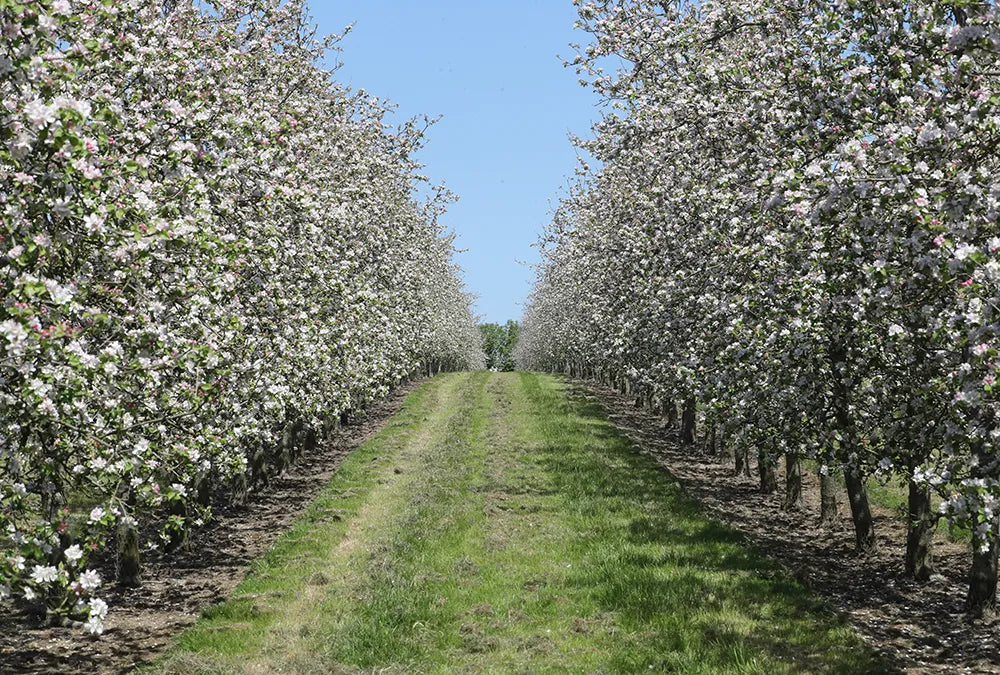
Blossom season. It’s blooming beautiful. And knowing its visit is fleeting makes it all the more magical each time it comes around. Even more so when it appears after an onerous era of grey skies and incessant showers.
So, as we carefully close the pruning season chapter, we eagerly turn the page in anticipation of what comes next. The picture of trees that have bared their branches and shivered in the breeze through a long, cold winter turns to one of a sea of pale pink petals shimmering in the soft spring sunlight. The setting for this particular story is, of course, the Showerings orchard in Somerset.
But with the less-than-ideal weather conditions we’ve experienced this winter, our spring update from the orchard doesn’t paint an entirely pretty picture. Here, we reflect on a winter we’re wishing away, and looking forward to welcoming in a new season with warmth – literally.

Looking back at the winter’s conditions
In a word: wet. The wettest on record, in fact. With no dry spells since the end of September, the whole country seems to be collectively willing the weather to brighten up. But no one more so than Bob Wady, our award-winning apple farmer and master of the Showerings orchards.
And as our on-the-ground expert, Bob has confirmed that the remnants from a season of precise pruning also remain on the ground – although their lingering presence on the orchard floor is much less welcome. A hangover from the wet winter conditions, these off-cuts would have usually been picked up and removed by now in a drier year, so as not to interfere with nature’s process. And with up to a fifth of each tree being removed, they’re hard to miss.

But that’s not all. To get to the root of the problem, we have to look at – you guessed it – the roots. During this part of the cidermaking process, the roots of our apple trees need to regrow in order to produce the perfectly balanced apples that turn into our classic triple vintage blend. However, this winter’s signature non-stop downpours rotted all our trees’ root hairs away, which even resulted in us losing a small number of our trees altogether.
It’s undeniable that, we, alongside all Britain’s farmers, have had a challenging year so far. But whilst these conditions can certainly be classified as a worst-case scenario winter for our beloved orchard, we’ve spent more than 180 years working with Somerset’s finest terroir and perfecting production techniques have been passed down through generations. So, we know exactly what it will take to get back on track.

Looking forward to what spring will bring
In short: sun. But as spring’s usually sunny disposition has been replaced with an unusually glum attitude this year, we would settle simply for some dry spells. We’re also ready to wave goodbye to the north winds that have been blustering through Britain, coating the country with an extra chill – especially for this time of year.
Right now, the riskiest thing would be if spring’s current gloominess turned into downright frostiness. Frosts in late spring always pose a massive risk, as it can destroy the trees’ blossoms and flowers. But if there’s one positive side effect from this winter’s wet conditions, it’s that our trees are progressing slower than usual and won’t bloom until later on in spring, when the weather is warmer. So, the risk of any frost bestowing a fatal bite to our blossom is lower. Phew.
There is (sun)light at the end of this (very dark and damp) tunnel. Our orchard is expected to bloom in early May this year. And once the apple blossom has scattered a satisfying sprinkling of petals over each tree, memories of this wet winter will fade and we’ll pour ourselves a chilled glass of Showerings cider to celebrate.
